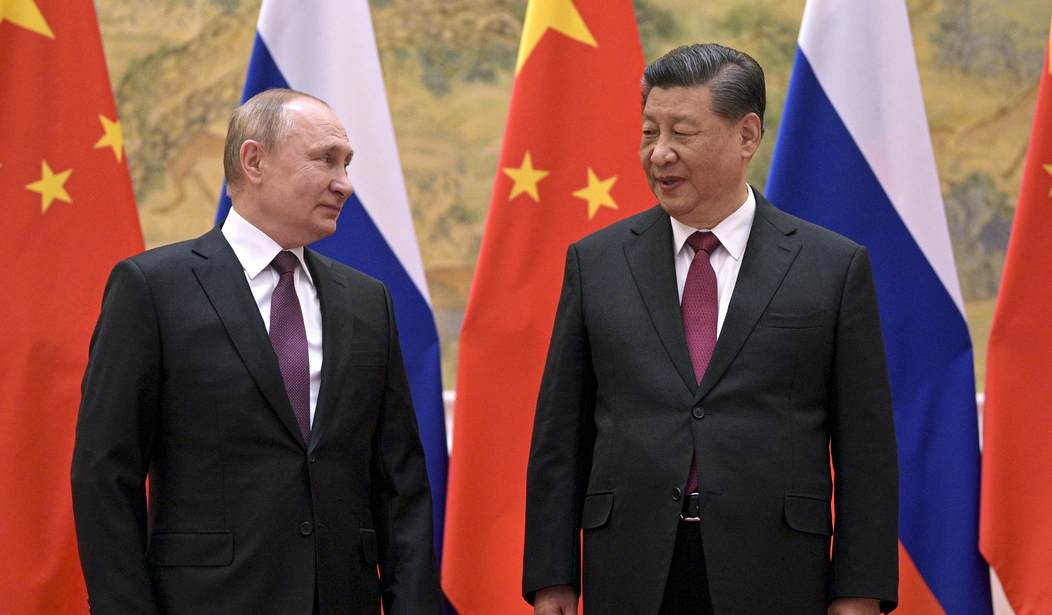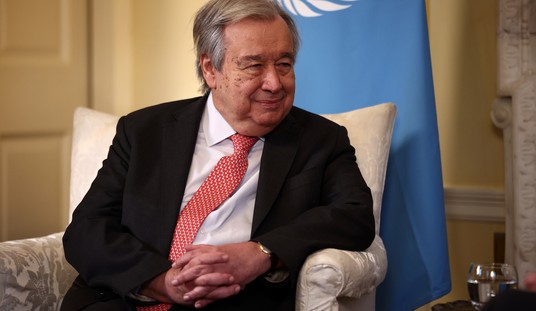What if your grand plans for economic self-sufficiency turned out instead to just make it easier to cut you off from the global economy? The Wall Street Journal’s report on the failure of Fortress Russia makes for compelling reading, and not just in Moscow. Vladimir Putin’s claims to have created an economy that could ignore the West have collapsed in dramatic fashion, and perhaps with it his façade of invincibility.
In fact, it might have backfired spectacularly:
Russia spent years trying to wean itself off imported goods to fortify its economy against Western sanctions.
Now, the impact of sanctions imposed after Russia’s invasion of Ukraine has made it clear that Moscow’s efforts didn’t work. Russia’s continued dependence on imports means it is facing a painful economic readjustment.
Parts of Russia’s auto industry are shutting down for lack of foreign parts. The country’s flagship homemade passenger jet gets its engine and other key parts from overseas suppliers. Foreign pet food and medication have disappeared from store shelves.
“Import substitution has failed to achieve its goal of making Russia less vulnerable to sanctions like these,” said Janis Kluge, a specialist in the Russian economy at the German Institute for International and Security Affairs. “The Russian ambitions were unrealistic to start with because a small economy like Russia’s isn’t able to produce complex and high-tech goods by itself. It’s just simply not possible.” Replacing the foreign products could take years, he added.
It’s not just Russia’s small economy that made these ambitions impossible, and perhaps it’s more of a symptom than a root cause. The root cause is the corrupt autocratic system that runs Russia, which is what keeps its economy small and its people unmotivated to expand. The stunted economy is an outcome of these economic and political systems, as Kevin Williamson argued at National Review:
The free world isn’t free because it is rich — it is rich because it is free. Freedom is not only a moral good but also a practical one: Because we have a system that enables us to fail quickly and fail cheaply, we can try many different approaches to social and material problems, throwing everything we have at them and seeing what works. Authoritarian societies, in contrast, have trouble adapting to fluid conditions, often discomfited by problems that cannot be solved with bayonets. One by one, Americans and Germans and Englishmen aren’t any more intelligent than Russians or Chinese or Saudis, but the institutions of free societies — from the free press to competitive elections — enable free people to rally and deploy their collective intelligence in a way that is difficult or impossible in unfree societies.
Authoritarian societies do not even really confer the one advantage you would think they would: stability.
So this exercise was doomed before it ever got started. Even before Putin launched his war in Ukraine, evidence of failure abounded:
But Russia’s dependence on imports actually worsened over the years. In 2021, some 81% of manufacturers said they couldn’t find any Russian versions of imported products they needed. More than half were dissatisfied with the quality of homegrown production. Both figures were the highest recorded since the survey by Russia’s Gaidar Institute for Economic Policy began in 2015.
In 2020, imports accounted for 75% of sales of nonfood consumer goods in the Russian retail market, according to a study by the Higher School of Economics in Moscow. In some sectors the share was even higher, rising to 86% for telecommunications equipment, the study found. Imports equaled around a fifth of GDP in 2020, compared with 16% in China and higher than other big economies such as India and Brazil.
Economic sanctions such as these cut in both directions, of course. It damages the economies of the nations that impose them as well as the nations targeted. The point, of course, is to make sure most of the damage cuts against the target rather than the originating nations. In that sense, it helps if the targeted nation had already started making it costly for others to operate in their space.
That brings us to Vladimir Putin’s newest bestest buddy, Xi Jinping. Xi has also pursued a similar economic program in China, where Made in China 2025 has been policy for almost the same period of time as Putin’s economic Fortress Russia. Introduced in May 2015 by Xi himself, the strategy aims a little higher at global manufacturing leadership but is based on the same ambitions of self-sufficiency:
- MIC 2025 is an initiative which strives to secure China’s position a global powerhouse in high-tech industries.
- The aim is to reduce China’s reliance on foreign technology imports and invest heavily in its own innovations in order to create Chinese companies that can compete both domestically and globally.
- China sees MIC 2025 as a chance to fully integrate into the global manufacturing chain and more effectively cooperate with industrialized economies.
- Chinese officials have claimed that leading economies with high-tech industries such as the EU, Germany and the United States have expressed their hostility to the initiative due to the fact that it would move China from a low-cost manufacturer to a direct added-value competitor.
Even if key targets are not achieved, the initiative will improve China’s “overall economic governance’” and strengthen its financial, education, healthcare, and manufacturing sectors. The plan involves replacing China’s reliance on foreign technology imports with its own innovations and creating Chinese companies that can compete both domestically and globally. Therefore, there is a strong emphasis on its domestic manufacturing process where it wishes to increase production, not only on the essential components, but on the final product as well. With a focus on quality, the investment is towards technological innovation and smart manufacturing in areas such as machine learning, where the technology that is difficult to replicate via reverse engineering.
Has it worked that way in practice? To some extent, yes, but not fully — and now it looks as though it might never achieve any of its goals. The COVID-19 pandemic forced Western nations to stop its profit cycle with China and consider the danger inherent in the Xi regime, especially its weapons research. The genocide of the Uighurs has made it more difficult for Western companies to play along too. Xi’s decision to back Putin may well land some sanctions against Chinese companies as a side effect, and Xi has gotten his first look at how effective collective economic action by the West can be.
Plus, China’s cutting its own throat in its COVID-19 choices. Their insistence on opacity and the exclusive use of their own worthless vaccines means that Beijing has to impose massive lockdowns with every successive variant. That alone will force Western companies to relocate their supply chains outside of China even without formal sanctions in place. Self-sufficiency in China may soon be exposed as just as fanciful a notion as it is in Russia, whether Xi recognizes it or not.
As for Putin, he’s coming to a decision point on whether he wants to permanently impoverish Russia as a consequence of seizing Ukraine and having to deal with insurgencies for years to come. He may be mad enough to try to see the Ukraine war to its very bitter end, but if he does, Putin might come to a bitter end first thanks to the failure of his economic Fortress Russia. The consequences of backfire at this level and in that environment go well beyond economics, after all.








Join the conversation as a VIP Member